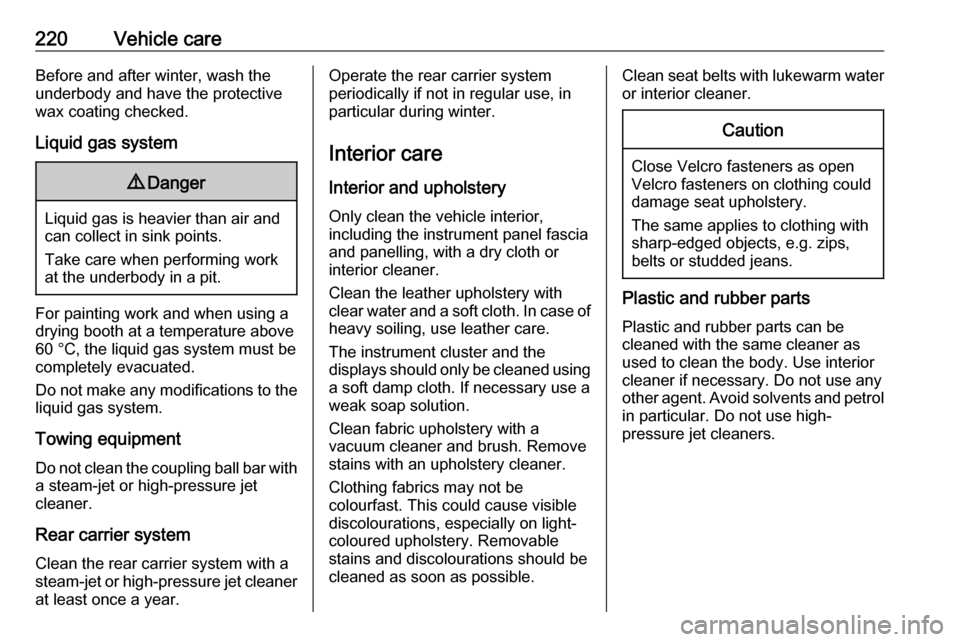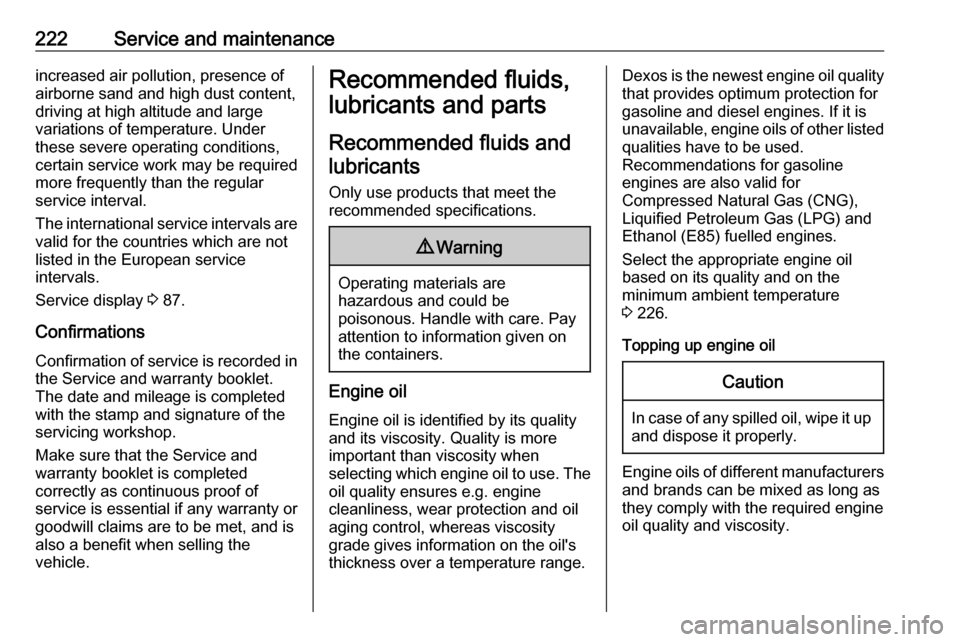display OPEL MOKKA X 2019 Manual user
[x] Cancel search | Manufacturer: OPEL, Model Year: 2019, Model line: MOKKA X, Model: OPEL MOKKA X 2019Pages: 253, PDF Size: 6.86 MB
Page 204 of 253

202Vehicle careAll wheels must be equipped with
pressure sensors and the tyres must
have the prescribed pressure.
Note
In countries where the tyre pressure monitoring system is legally
required, the use of wheels without
pressure sensors will invalidate the
vehicle operating permit.
The current tyre pressures can be
shown in the Driver Information
Centre.
Midlevel display:
Select the Tyre pressure page under
the Vehicle Information Menu ? in
the Driver Information Centre 3 97.
Uplevel display:
Select the Tyre pressure page under
the Info Menu in the Driver
Information Centre 3 97.
System status and pressure warnings
are displayed by a message
indicating the corresponding tyre in
the Driver Information Centre.
The system considers the tyre
temperature for the warnings.
Temperature dependency 3 200.
A detected low tyre pressure
condition is indicated by the control
indicator w 3 95.
If w illuminates, stop as soon as
possible and inflate the tyres as
recommended 3 235.
If w flashes for 60-90 seconds and
then illuminates continuously, there is a fault in the system. Consult a
workshop.
After inflating, some driving may be
required to update the tyre pressure
values in the Driver Information
Centre. During this time w may
illuminate.
If w illuminates at lower temperatures
and extinguishes after driving, this
could be an indicator for approaching
a low tyre pressure condition. Check
tyre pressure.
Vehicle messages 3 104.
Page 205 of 253

Vehicle care203If the tyre pressure must be reduced
or increased, switch off ignition.
Only mount wheels with pressure
sensors, otherwise the tyre pressure
will not be displayed and w
illuminates continuously.
A spare wheel or temporary spare
wheel is not equipped with pressure
sensors. The tyre pressure
monitoring system is not operational
for these tyres. Control indicator w
illuminates. For the further three
tyres, the system remains
operational.
The use of commercially-available liquid tyre repair kits can impair the
function of the system. Factory-
approved repair kits can be used.
Operating electronic devices or being
close to facilities using similar wave
frequencies could disrupt the tyre
pressure monitoring system.
Each time the tyres are replaced, tyre pressure monitoring system sensors
must be dismounted and serviced.
For the screwed sensor, replace
valve core and sealing ring. For the
clipped sensor, replace complete
valve stem.Vehicle loading status
Adjust tyre pressure to load condition
according to tyre information label or
tyre pressure chart 3 235, and select
the appropriate setting in the menu Tyre Load in the Driver Information
Centre, Vehicle Information Menu
3 97. This setting is the reference for
the tyre pressure warnings.
The Tyre load menu only appears
when the vehicle is at a standstill and the parking brake is applied. On
vehicles with automatic transmission
the selector lever must be in P.
Midlevel display:Select the Tyre load page under the
Vehicle Information Menu ? in the
Driver Information Centre 3 97.
● Light for comfort pressure up to
three people.
● Eco for Eco pressure up to three
people.
● Max for full loading.
Uplevel display:
Select the Tyre load page under the
Options Menu in the Driver
Information Centre 3 97.
Page 206 of 253

204Vehicle care●Light for comfort pressure up to
three people.
● Eco for Eco pressure up to three
people.
● Max for full loading.
Tyre pressure sensor matching process
Each tyre pressure sensor has a
unique identification code. The
identification code must be matched
to a new wheel position after rotating
the wheels or exchanging the
complete wheel set and if one or more tyre pressure sensors were replaced.The tyre pressure sensor matching
process should also be performed
after replacing a spare wheel with a
road wheel containing a tyre pressure
sensor.
The malfunction light w and the
warning message should extinguish
at the next ignition cycle. The sensors
are matched to the wheel positions,
using a relearn tool, in the following
order: left side front wheel, right side
front wheel, right side rear wheel andleft side rear wheel. The turn signal
light at the current active position is
illuminated until sensor is matched.
Consult a workshop for service. There are two minutes to match the first
wheel position, and five minutes
overall to match all four wheel
positions. If it takes longer, the
matching process stops and must be
restarted.
The tyre pressure sensor matching
process is:
1. Apply the parking brake.
2. Turn the ignition on.
3. On vehicles with automatic transmission: set the selector
lever to P.
On vehicles with manual
transmission: select neutral.
4. Press MENU on the turn signal
lever to select the Vehicle
Information Menu in the Driver
Information Centre.
5. Turn the adjuster wheel to scroll to
the tyre pressure menu.
Midlevel display:
Uplevel display:
Page 207 of 253

Vehicle care2056. Press SET/CLR to begin the
sensor matching process. A
message requesting acceptance
of the process should be
displayed.
7. Press SET/CLR again to confirm
the selection. The horn sounds
twice to signal that the receiver is
in relearn mode.
8. Start with the left side front wheel.
9. Place the relearn tool against the tyre sidewall, near the valve stem.
Then press the button to activate
the tyre pressure sensor. A horn
chirp confirms that the sensor
identification code has been
matched to this tyre and wheel
position.
10. Proceed to the right side front wheel, and repeat the procedure
in Step 9.
11. Proceed to the right side rear wheel, and repeat the procedure
in Step 9.
12. Proceed to the left side rear wheel, and repeat the procedure
in Step 9. The horn sounds twice
to indicate the sensoridentification code has been
matched to the left side rear
wheel, and the tyre pressure
sensor matching process is no
longer active.
13. Turn off the ignition.
14. Set all four tyres to the recommended air pressure level
as indicated on the tyre pressure
information label.
15. Ensure the tyre loading status is set according to the selected tyre
pressure 3 97.
Tread depth
Check tread depth at regular
intervals.
Tyres should be replaced for safety
reasons at a tread depth of 2-3 mm
(4 mm for winter tyres).
For safety reasons it is recommended
that the tread depth of the tyres on
one axle should not vary by more than 2 mm.
The legally permissible minimum
tread depth (1.6 mm) has been
reached when the tread has worn
down as far as one of the tread wear
indicators (TWI). Their position is
indicated by markings on the
sidewall.
If there is more wear at the front than
the rear, swap round front wheels and rear wheels. Ensure that the direction
of rotation of the wheels is the same
as before.
Tyres age, even if they are not used.
We recommend tyre replacement
every six years.
Page 222 of 253

220Vehicle careBefore and after winter, wash the
underbody and have the protective
wax coating checked.
Liquid gas system9 Danger
Liquid gas is heavier than air and
can collect in sink points.
Take care when performing work
at the underbody in a pit.
For painting work and when using a
drying booth at a temperature above
60 °C, the liquid gas system must be
completely evacuated.
Do not make any modifications to the
liquid gas system.
Towing equipment
Do not clean the coupling ball bar with a steam-jet or high-pressure jet
cleaner.
Rear carrier system Clean the rear carrier system with a
steam-jet or high-pressure jet cleaner
at least once a year.
Operate the rear carrier system
periodically if not in regular use, in
particular during winter.
Interior care
Interior and upholstery Only clean the vehicle interior,
including the instrument panel fascia
and panelling, with a dry cloth or
interior cleaner.
Clean the leather upholstery with
clear water and a soft cloth. In case of
heavy soiling, use leather care.
The instrument cluster and the
displays should only be cleaned using
a soft damp cloth. If necessary use a
weak soap solution.
Clean fabric upholstery with a
vacuum cleaner and brush. Remove
stains with an upholstery cleaner.
Clothing fabrics may not be
colourfast. This could cause visible
discolourations, especially on light- coloured upholstery. Removable
stains and discolourations should be
cleaned as soon as possible.Clean seat belts with lukewarm water or interior cleaner.Caution
Close Velcro fasteners as open
Velcro fasteners on clothing could damage seat upholstery.
The same applies to clothing with
sharp-edged objects, e.g. zips, belts or studded jeans.
Plastic and rubber parts
Plastic and rubber parts can be
cleaned with the same cleaner as
used to clean the body. Use interior
cleaner if necessary. Do not use any
other agent. Avoid solvents and petrol in particular. Do not use high-
pressure jet cleaners.
Page 223 of 253

Service and maintenance221Service and
maintenanceGeneral information ...................221
Service information ..................221
Recommended fluids, lubricants and parts .................................... 222
Recommended fluids and lubricants ................................ 222General information
Service information In order to ensure economical and
safe vehicle operation and to
maintain the value of your vehicle, it
is of vital importance that all
maintenance work is carried out at the proper intervals as specified.
The detailed, up-to-date service
schedule for your vehicle is available
at the workshop.
Service display 3 87.
European service intervals
Maintenance of your vehicle is
required every 30,000 km or after one year, whichever occurs first, unless
otherwise indicated in the service
display.
A shorter service interval can be valid for severe driving behaviour, e.g. for
taxis and police vehicles.
The European service intervals are
valid for the following countries:Andorra, Austria, Belgium, Bosnia-
Herzegovina, Bulgaria, Croatia,
Cyprus, Czech Republic, Denmark,
Estonia, Finland, France, Germany,
Greece, Greenland, Hungary,
Iceland, Ireland, Italy, Latvia,
Liechtenstein, Lithuania,
Luxembourg, Macedonia, Malta,
Monaco, Montenegro, Netherlands,
Norway, Poland, Portugal, Romania,
San Marino, Serbia, Slovakia,
Slovenia, Spain, Sweden,
Switzerland, United Kingdom.
Service display 3 87.
International service intervals
Maintenance of your vehicle is
required every 15,000 km or after one
year, whichever occurs first.
Additional engine oil and filter change is indicated by the engine oil life
system, when required earlier than
maintenance.
Severe operating conditions exist if
one or more of the following
circumstances occur frequently: Cold
starting, stop and go operation, trailer operation, mountain driving, driving
on poor and sandy road surfaces,
Page 224 of 253

222Service and maintenanceincreased air pollution, presence of
airborne sand and high dust content,
driving at high altitude and large
variations of temperature. Under
these severe operating conditions,
certain service work may be required more frequently than the regular
service interval.
The international service intervals are
valid for the countries which are not
listed in the European service
intervals.
Service display 3 87.
Confirmations Confirmation of service is recorded in
the Service and warranty booklet.
The date and mileage is completed
with the stamp and signature of the
servicing workshop.
Make sure that the Service and
warranty booklet is completed
correctly as continuous proof of
service is essential if any warranty or goodwill claims are to be met, and is
also a benefit when selling the
vehicle.Recommended fluids,
lubricants and parts
Recommended fluids andlubricants
Only use products that meet the
recommended specifications.9 Warning
Operating materials are
hazardous and could be
poisonous. Handle with care. Pay
attention to information given on
the containers.
Engine oil
Engine oil is identified by its quality
and its viscosity. Quality is more
important than viscosity when
selecting which engine oil to use. The oil quality ensures e.g. engine
cleanliness, wear protection and oil
aging control, whereas viscosity
grade gives information on the oil's
thickness over a temperature range.
Dexos is the newest engine oil quality
that provides optimum protection for gasoline and diesel engines. If it isunavailable, engine oils of other listed qualities have to be used.
Recommendations for gasoline
engines are also valid for
Compressed Natural Gas (CNG),
Liquified Petroleum Gas (LPG) and
Ethanol (E85) fuelled engines.
Select the appropriate engine oil
based on its quality and on the
minimum ambient temperature
3 226.
Topping up engine oilCaution
In case of any spilled oil, wipe it up and dispose it properly.
Engine oils of different manufacturersand brands can be mixed as long as
they comply with the required engine
oil quality and viscosity.
Page 244 of 253

242Customer informationEnGIS Technologies, Inc.
BringGo ®
is a registered trademark of
EnGIS Technologies, Inc.Google Inc.
Android™ and Google Play™ Store
are trademarks of Google Inc.Stitcher Inc.
Stitcher™ is a trademark of Stitcher,
Inc.Verband der Automobilindustrie e.V.
AdBlue ®
is a registered trademark of
the VDA.Vehicle data recording
and privacy
Event data recorders
Electronic control units are installed in
your vehicle. Control units process
data which is received by vehicle
sensors, for example, or which they
generate themselves or exchange
amongst themselves. Some control
units are necessary for the safe
functioning of your vehicle, others
assist you while you drive (driver
assistance systems), while others
provide comfort or infotainment
functions.
The following contains general
information about data processing in
the vehicle. You will find additional
information as to which specific data
is uploaded, stored and passed on to third parties and for what purpose in
your vehicle under the key word Data Protection closely linked to the
references for the affected functional
characteristics in the relevant owner's
manual or in the general terms of
sale. These are also available online.Operating data in the vehicle
Control units process data for
operation of the vehicle.
This data includes, e.g.: ● vehicle status information (e.g. speed, movement delay, lateral
acceleration, wheel rotation rate, "seat belts fastened" display)
● ambient conditions (e.g. temperature, rain sensor,
distance sensor)
As a rule such data is transient, not
stored for longer than an operational
cycle, and only processed on board
the vehicle itself. Control units often
include data storage (including the vehicle key). This is used to allowinformation to be documented
temporarily or permanently on vehicle
condition, component stress,
maintenance requirements and
technical events and errors.
Page 250 of 253

248Heated mirrors ............................. 34
Heated rear window ..................... 37
Heated steering wheel .................77
Heating ........................................ 43
Heating and ventilation system . 127
High beam ........................... 96, 117
High beam assist ..................96, 118
Hill start assist ........................... 152
Horn ....................................... 14, 78
I
Identification plate .....................224
Ignition switch positions .............135
Immobiliser ............................ 32, 96
Indicators ...................................... 84
Info Display ................................. 102
Information displays...................... 97
Initial drive information.................... 6
Instrument panel fuse box .........195
Instrument panel illumination control .................................... 124
Instrument panel overview ........... 10
Interior care ............................... 220
Interior lighting ............................ 124
Interior lights .............................. 124
Interior mirrors .............................. 34
Interruption of power supply ......149
Introduction .................................... 3
J
Jump starting ............................. 214K
Key, memorised settings ..............25
Keys ............................................. 21
Keys, locks ................................... 21
L
Lane departure warning .......94, 168
Lashing eyes ............................... 73
Lighting features .........................125
Light switch ................................ 116
Load compartment ................30, 71
Load compartment cover .............72
Load compartment fuse box ......197
Loading information .....................74
Low fuel ....................................... 95
LPG .............................. 86, 171, 226
M Malfunction indicator light ............93
Manual anti-dazzle ......................34
Manual mode ............................. 148
Manual transmission .................. 149
Manual windows ..........................35
Memorised settings ......................25
Midlevel display ............................ 97
Mirror adjustment ........................... 8
Misted light covers .....................124
N New vehicle running-in ..............134
Number plate light .....................192O
Object detection systems ...........161
Odometer ..................................... 84
Oil, engine .......................... 222, 226
OnStar ........................................ 110
Outside temperature ....................80
Overrun cut-off ........................... 139
P Parking ................................ 19, 141
Parking assist ............................ 161
Parking brake ............................ 151
Particulate filter ........................... 142
Performance .............................. 231
Performing work ........................182
Power button .............................. 136
Power outlets ............................... 83
Power steering fluid ....................184
Power windows ............................ 35
Preheating ................................... 95
Puncture ..................................... 210
R Radio Frequency Identification (RFID) ..................................... 245
Radio remote control ...................22
REACH ....................................... 240
Reading lights ............................ 125
Rear carrier system ......................61
Rear floor storage cover ..............73
Rear fog light ...............96, 123, 192
Page 251 of 253

249Rear view camera ...................... 163
Rear window wiper and washer ..80
Recommended fluids and lubricants ........................ 222, 226
Refuelling ................................... 172
Registered trademarks ...............241
Retained power off .....................137
Reversing lights .........................123
Ride control systems ..................152
Roof .............................................. 37
Roof load ...................................... 74
Roof rack ..................................... 74
S Seat adjustment ....................... 6, 41
Seat belt ........................................ 8
Seat belt reminder .......................92
Seat belts ..................................... 44
Seat heating ................................. 43
Seat position ................................ 40
Selective catalytic reduction .......144
Selector lever ............................. 147
Service ....................................... 132
Service display ............................ 87
Service information ....................221
Side airbag system ......................51
Software acknowledgement .......240
Spare wheel ............................... 211
Speed limiter......................... 97, 157
Speedometer ............................... 84Starting and operating ................134
Starting off ................................... 17
Starting the engine ....................137
Steering ...................................... 134
Steering wheel adjustment ......9, 77
Steering wheel controls ...............77
Stop-start system........................ 139
Storage compartments .................59
Sunroof ........................................ 37
Sunvisor lights ........................... 125
Sun visors .................................... 37
Symbols ......................................... 4
T
Tachometer ................................. 85
Tail lights ................................... 191
Three-point seat belt .................... 45
Tools .......................................... 199
Tow bar....................................... 176
Towing ................................ 176, 216
Towing another vehicle .............217
Towing equipment .....................177
Towing the vehicle .....................216
Traction Control system ............. 152
Traction Control system off........... 95
Traffic sign assistant .............97, 165
Trailer towing ............................. 177
Transmission ............................... 17
Transmission display .................146
Tread depth ............................... 205Trip odometer .............................. 84
Turn lights ............................ 92, 123
Tyre chains ................................ 206
Tyre designations ......................200
Tyre pressure ............................ 200
Tyre pressure monitoring system ............................... 95, 201
Tyre pressures ........................... 235
Tyre repair kit ............................. 207
U Ultrasonic parking assist............. 161
Underseat storage .......................60
Upholstery .................................. 220
Uplevel display ............................. 97
Using this manual ..........................3
V Valet mode ................................. 102
Vehicle battery ........................... 186
Vehicle checks............................ 182
Vehicle data ................................ 226
Vehicle data recording and privacy ..................................... 242
Vehicle detected ahead ................97
Vehicle dimensions .................... 233
Vehicle Identification Number ....224
Vehicle jack ................................ 199
Vehicle messages .....................104
Vehicle personalisation .............106
Vehicle security ............................ 31